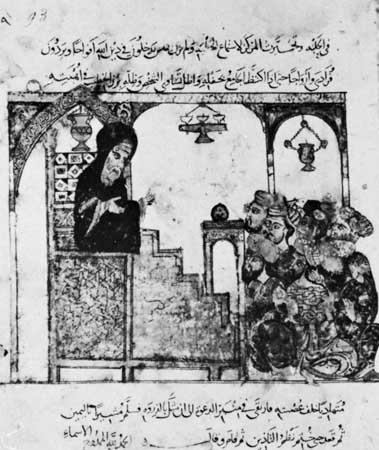Ḥarīrī, al-
Islamic scholar
in full Abū Muḥammad al-Qāsim ibn ʿAlī al-Ḥarīrī
born 1054, near Al-Baṣrah, Iraq
died 1122, Al-Baṣrah
 scholar of Arabic language and literature and government official who is primarily known for the refined style and wit of his collection of tales, the Maqāmāt, published in English as The Assemblies of al-Harîrî (1867, 1898).
scholar of Arabic language and literature and government official who is primarily known for the refined style and wit of his collection of tales, the Maqāmāt, published in English as The Assemblies of al-Harîrî (1867, 1898). His works include a long poem on grammar (Mulḥat al-iʿrāb fī al-naḥw), for which he also wrote a commentary, and a book on errors of expression in Arabic (Durrat al-ghawwāṣ fī awhām al-khawaṣṣ). The Maqāmāt recounts in the words of the narrator, al-Ḥārith ibn Hammām, his repeated encounters with Abū Zayd al-Sarūjī, an unabashed confidence artist and wanderer possessing all the eloquence, grammatical knowledge, and poetic ability of al-Ḥarīrī himself. Time and again, al-Ḥārith finds Abū Zayd at the centre of a throng of people in a new city. Abū Zayd brings tears to his listeners' eyes with the vivid description of his pretended hardships and dazzles them with his poetry and then suddenly disappears with their presents. Al-Ḥarīrī's Maqāmāt seems to unite his experiences as an information officer with his authoritative knowledge of Arabic grammar, style, and verse. These tales are filled not only with humour and adventure but with linguistic and poetic feats as well. This maqāmah (“assembly”) style was not al-Ḥarīrī's invention. He openly acknowledged his debt to its creator, al-Hamadhānī (Hamadhānī, al-), but, unlike al-Hamadhānī, he composed his tales in writing and presented them in his own “authorized” version. Al-Ḥarīrī's Maqāmāt was a popular subject for book illustrators during the 18th century and was the basis for lively depictions of scenes of everyday life.
His works include a long poem on grammar (Mulḥat al-iʿrāb fī al-naḥw), for which he also wrote a commentary, and a book on errors of expression in Arabic (Durrat al-ghawwāṣ fī awhām al-khawaṣṣ). The Maqāmāt recounts in the words of the narrator, al-Ḥārith ibn Hammām, his repeated encounters with Abū Zayd al-Sarūjī, an unabashed confidence artist and wanderer possessing all the eloquence, grammatical knowledge, and poetic ability of al-Ḥarīrī himself. Time and again, al-Ḥārith finds Abū Zayd at the centre of a throng of people in a new city. Abū Zayd brings tears to his listeners' eyes with the vivid description of his pretended hardships and dazzles them with his poetry and then suddenly disappears with their presents. Al-Ḥarīrī's Maqāmāt seems to unite his experiences as an information officer with his authoritative knowledge of Arabic grammar, style, and verse. These tales are filled not only with humour and adventure but with linguistic and poetic feats as well. This maqāmah (“assembly”) style was not al-Ḥarīrī's invention. He openly acknowledged his debt to its creator, al-Hamadhānī (Hamadhānī, al-), but, unlike al-Hamadhānī, he composed his tales in writing and presented them in his own “authorized” version. Al-Ḥarīrī's Maqāmāt was a popular subject for book illustrators during the 18th century and was the basis for lively depictions of scenes of everyday life.- Georges Auric
- George Savile, 1st marquess of Halifax
- George Savile Halifax, 1st marquess of
- Georges, Baron Cuvier
- Georges Bataille
- Georges Bernanos
- Georges Bidault
- Georges Bizet
- Georges Blondel
- Georges Boulanger
- Georges Braque
- Georges Carpentier
- Georges Catroux
- Georges Charpak
- Georges Chastellain
- Georges Claude
- Georges Clemenceau
- Georges Courteline
- Georges Couthon
- Georges Cuvier, Baron
- Georges d' Amboise
- Georges Danton
- Georges de La Tour
- Georges de La Trémoille
- Georges de Porto-Riche